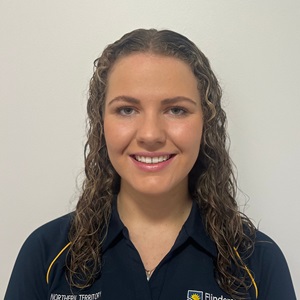
Tiana James
Indigenous Health Scholarship
Flinders University, NT.
Bachelor of Medical Science
Scholarship Awarded 2025
Sponsored by:
Rotary Club of Litchfield/Palmerston
Student Profile
My name is Tiana James, and I am a proud Darkinjung woman. I completed a Bachelor of Clinical Sciences straight after finishing school through the CDU program, which provided me with direct entry into the Flinders NT Medical Program. I am now in my second year of medicine at Flinders University, working towards a career in rural and remote medicine.
For six years, my family and I travelled across Australia, spending time in remote communities and experiencing first-hand the challenges of healthcare access in these areas. This time gave me a deep appreciation for the resilience of these communities, as well as an understanding of the barriers they face, from limited medical resources to geographical isolation.
These experiences have shaped my desire to work in remote regions, where I can provide care that is both practical and culturally appropriate. I am particularly interested in improving healthcare accessibility and supporting sustainable solutions for rural communities. With my medical training, I hope to contribute to ensuring that people in remote areas receive the quality care and support they need.
How will I contribute to improving Indigenous health as a qualified medical practitioner or health worker?
As an Indigenous woman in my second year of medicine, I am deeply committed to improving health outcomes in Indigenous communities, particularly in remote areas. Growing up, my family travelled through these regions, exposing me to the challenges of limited healthcare access, scarce resources, and culturally unsafe environments. These experiences have shaped my passion for working in underserved locations.
With a Bachelor of Clinical Science and ongoing medical training, I aim to address healthcare disparities by providing culturally safe, accessible, and responsive care. I understand the mistrust many Indigenous communities feel towards Western medicine and will work to build trusting relationships by integrating cultural values into clinical practice.
Preventive care and health education will be central to my approach, empowering individuals to manage their health long-term. Additionally, I recognise the need for sustainable healthcare solutions, whether through direct patient care, training local health workers, or advocating for better infrastructure.
My upbringing has instilled in me the resilience, adaptability, and commitment required for remote healthcare. I am determined to use my skills, cultural understanding, and lived experience to make a meaningful difference, ensuring Indigenous communities receive the healthcare they deserve.
Current Progressive Report
The end of semester 2 marked an important turning point in my medical training as I began the transition from pre-clinical learning toward clinical placement. This semester gave me valuable insight into what lies ahead in the clinical years of my degree and helped bridge the gap between theoretical knowledge and real-world patient care.
Throughout the semester, I was increasingly exposed to clinical thinking and case-based learning, which challenged me to move beyond memorisation and conceptual learning to begin applying this knowledge with reasoning. Applying foundational knowledge to patient presentations, investigations, and management plans has given me insight into what is expected of me in the next 2 years of training. These experiences have clarified what my role is as a student as I progress into the clinical environment and has reinforced the importance of preparation, adaptability, and professionalism in patient-facing settings.
This period of transition has also strengthened my sense of purpose in pursuing medicine. Seeing how medical knowledge translates into meaningful patient outcomes has been a powerful reminder of why I chose this path. It has highlighted the importance of compassionate, patient-centred care and the value of working collaboratively within healthcare teams, particularly in settings where resources may be limited and continuity of care is vital.
Since completing semester 2, I have relocated to Alice Springs, where I will be based for the next 12 months to complete the first half of my clinical placement. This move is an exciting and significant step in my training. Living and learning in a regional and remote setting will provide invaluable exposure to the unique health challenges faced by communities in Central Australia. I am particularly looking forward to developing my clinical skills while gaining a deeper understanding of the social, environmental, and systemic factors that influence health and access to care in this region.